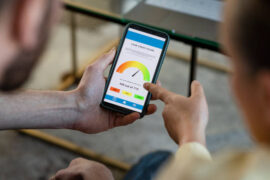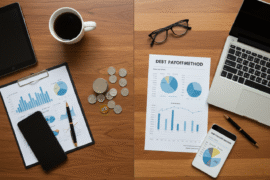This article may contain references to products or services from one or more of our advertisers or partners. We may receive compensation when you click on links to those products or services. Nonetheless, our opinions are our own.
The information presented in this article is accurate to the best of our knowledge at the time of publication. However, information is subject to change, and no guarantees are made about the continued accuracy or completeness of this content after its publication date.

Updated by Albert Fang
Are you tired of living paycheck to paycheck and feeling like your debt is suffocating you? Do you dream of being financially free and retiring on a yacht in the Whitsundays? Well, it’s time to get serious about balancing your debt and investment goals.
If you’re like most Aussies, you’re feeling the pinch. According to a recent Australian Bureau of Statistics study, the average household debt in Australia was $261,492 in 2021-22. That’s a lot of money.
But don’t despair. You can turn your financial situation around with a bit of intelligent planning and a dash of Aussie wit. This article will reveal some exciting ways to rid you of debt and start paving your way to financial freedom.
How to Reduce Debt
Get real about your debt
The first step to balancing your debt and investment goals is to get a clear picture of what you owe. Make a list of all your debts, including credit cards, personal loans, and mortgages. Then, rank them in order of interest rate, with the highest interest debt at the top of the list.
Attack the high-interest debt first
Once you have your list, it’s time to start paying down the high-interest debt. This will save you money in the long run, as you’ll pay fewer interest charges. Plus, the satisfaction of paying off debt is a huge motivator.
Create a budget
The first step in getting rid of debt is understanding where your money is going. Create a budget that tracks your income and expenses, so you can see exactly where you need to cut back.
Increase your income
Consider taking on a side hustle, working overtime, or selling unused items to increase your income and put more money towards debt repayment.
Reduce expenses
Consider reducing your monthly expenses, such as cutting back on eating out, entertainment, and subscription services. Small changes can add up to significant savings over time.
How to Invest Your Hard-Earned Money
Start with education
Take the time to learn about investing, the stock market, and different types of investments. This will help you make informed decisions.
Consider your risk tolerance
Assess your financial goals, risk tolerance, and time horizon to determine your best investment strategy.
Diversify your portfolio
Don’t put all your eggs in one basket. Diversifying your investments across multiple asset classes and industries can help manage risk.
Look for low-cost options
Look for low-cost investment options, such as index funds or exchange-traded funds (ETFs), to help reduce fees and maximise returns.
Take advantage of sign-up bonuses
Sign-up bonuses and offers are a prevalent practice among trading platforms. They represent an excellent way to start investing for free. Webull offers up to 12 free stocks upon signing up.
Utilise local platforms
Unfortunately, several famous US trading platforms are not available in Australia. For example, although Robinhood is not available for Australians, local investment platforms, such as ASX or CommSec, offer various investment options, including stocks, bonds, ETFs, and managed funds.
Voted "Best Overall Budgeting App" by Forbes and WSJ
Monarch Money helps you budget, track spending, set goals, and plan your financial future—all in one app.
Get 50% OFF your first year with code MONARCHVIP
Final Thoughts
In conclusion, managing debt and investment goals can feel like a tightrope walk, but with a little bit of effort and smart planning, you can achieve a healthy balance. Remember, it’s all about finding the right mix of paying off debt and investing for your future. When it comes to investing, stick to local trading platforms. When in doubt, start by checking the best trading platforms in Australia for beginners. However, always make sure you perform your due diligence.
And don’t forget, if all else fails, you can always fall back on the tried and true method of burying your head in the sand and hoping for the best. Just kidding! But seriously, taking control of your finances can be a rewarding experience, so get started today and watch your balance grow!
FAQs
How important is it to balance debt and investment goals?
Balancing debt and investment goals is crucial as it helps maintain financial stability and achieve long-term financial goals. By managing debt, individuals can free up money for investment and increase their wealth over time.
What are some strategies for balancing debt and investment goals in Australia?
There are several strategies for balancing debt and investment goals in Australia, including paying off high-interest debt first, investing in low-risk options, automating savings, and seeking professional financial advice.
Should I prioritize paying off debt or investing money?
The answer to this question depends on individual circumstances and financial goals. Generally, it is recommended to pay off high-interest debt first, such as credit card debt, before investing. This helps reduce the amount of money spent on interest payments, freeing up money for investment.
Are there any tax benefits for paying off debt in Australia?
No, there are no tax benefits for paying off debt in Australia.

Reviewed and edited by Albert Fang.
See a typo or want to suggest an edit/revision to the content? Use the contact us form to provide feedback.
At FangWallet, we value editorial integrity and open collaboration in curating quality content for readers to enjoy. Much appreciated for the assist.
Did you like our article and find it insightful? We encourage sharing the article link with family and friends to benefit as well - better yet, sharing on social media. Thank you for the support! 🍉
Article Title: The Australian’s Guide to Balancing Debt and Investment Goals
https://fangwallet.com/2023/02/07/the-australians-guide-to-balancing-debt-and-investment-goals/The FangWallet Promise
FangWallet is an editorially independent resource - founded on breaking down challenging financial concepts for anyone to understand since 2014. While we adhere to editorial integrity, note that this post may contain references to products from our partners.
The FangWallet promise is always to have your best interest in mind and be transparent and honest about the financial picture.
Become an Insider

Subscribe to get a free daily budget planner printable to help get your money on track!
Make passive money the right way. No spam.
Editorial Disclaimer: The editorial content on this page is not provided by any of the companies mentioned. The opinions expressed here are the author's alone.
The content of this website is for informational purposes only and does not represent investment advice, or an offer or solicitation to buy or sell any security, investment, or product. Investors are encouraged to do their own due diligence, and, if necessary, consult professional advising before making any investment decisions. Investing involves a high degree of risk, and financial losses may occur including the potential loss of principal.
Source Citation References:
+ Inspo












































